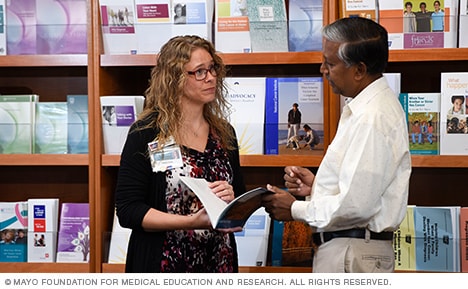
At Mayo Clinic Comprehensive Cancer Center, reliable, up-to-date education is central to a patient’s cancer care plan. The Stephen and Barbara Slaggie Family Cancer Education Center offers free education and resources to cancer patients and their support networks at all Mayo Clinic sites.
Resources include:
- Educational offerings
- Materials on cancer prevention, risks, screening, diagnosis, treatment, survivorship, and end-of-life care
- Information for family members and caregivers
- Lodging and financial guidance
- Online education and support
To learn. more, please visit the Mayo Clinic Comprehensive Cancer Center.
Minnesota Care Alliance
Staff members from the Mayo Clinic Comprehensive Cancer Center have collaborated with representatives across Minnesota in creating the state's first comprehensive cancer control plan, "Cancer Plan Minnesota." The plan is a framework for action that seeks to reduce the burden of cancer among Minnesotans. The plan is being implemented by the Minnesota Cancer Alliance, a voluntary association of health care organizations, community groups and advocates that offers free membership to any organization or individual interested in reducing the state's cancer burden.
Book – Mayo Clinic on Prostate Health
Answers to questions about prostate enlargement, inflammation and cancer
Prostate problems are among the most common reasons men see their doctors. That's because with age most men experience some type of prostate problem — enlargement, inflammation or cancer. Mayo Clinic on Prostate Health, 3rd Edition is an easy-to-read yet comprehensive guide to preventing, understanding, treating and living with prostate disease.
Prostate disease, including prostate cancer, often can be easily treated and even prevented. This book is an essential resource for every man, it explains how to maintain better prostate health, and how to evaluate treatment options when disease occurs. Prostate concerns often start out with changes in patterns of urination, difficulty with sexual function, or worry over hormone levels. Fortunately, the outlook for management, cure and survival of prostate disease is better now than ever before.
Topics covered in this updated edition include:
- The debate over PSA testing
- Advances in imaging technology
- Therapies for prostatitis and benign prostatic hyperplasia (BPH)
- Treatment options for prostate cancer
- Developments in prostate cancer research, and management of treatment side effects, including incontinence and sexual dysfunction.
Order your copy: Mayo Clinic on Prostate Health
 Connect
Connect
 Connect
Connect